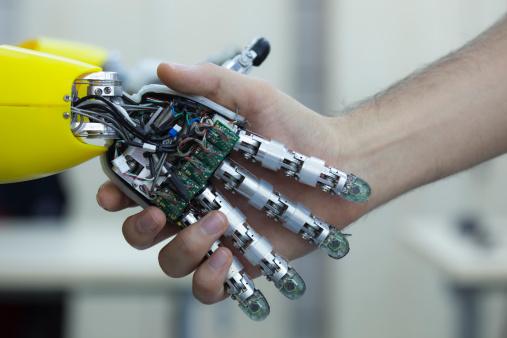One thing seems safe to say, people will need to keep their skills up-to-date and frequent training will be key to staying on top of the changes. The future of work will soon become ‘the survival of the most adaptable’, says Paul Mason, emerging technologies director for Innovate UK, speaking in a recent Guardian newspaper article.
Experts, gathered together for a round table discussion by the Guardian, included academics, business leaders and economists. Most agreed that training will be more important than ever, but Mark Spelman, member of the executive committee for the World Economic Forum, says there will be winners and losers in this new world.
‘The idea of continuous training is optimistic – I imagine there will be one-day training blitzes where people learn new skills quickly, and then are employed for a month while they’re needed,’ he says. This could make part-time, freelance work more prevalent.
Anand Chopra-McGowan, head of business development for the enterprise education group at General Assembly, also sees a time when a ‘job for life’ is a thing of the past.
‘Workers of the future will need to be highly adaptable and juggle three or more different roles at a time,’ he says. So on going education will play a key role in helping people develop new skills.
But although the changing workplace brings its own challenges, round table participants were quick to point out that technology can also be a great boost. ‘If you use technology to reduce accidents, produce food for people and save time – that provides a great societal value,’ says Spelman. He adds this currently doesn’t fit in with the idea of maximising profits. ‘In future we need to put societal and shareholder value together.’
So far technology has been used to make old practices quicker and cheaper, but we are coming to a time when computers can learn and adapt. Since we, the humans, design and create computers to do what we want them to do, new advances will respond to how people want technology to change.
Though the future of work is unclear, the panel agreed that one thing is for certain: the nature of work is going to change – the jobs of tomorrow won’t be the same as jobs of today. Maybe now’s the time to take a look at the EURES portal on training opportunities around the EU!
Related links:
Also from the Guardian: Intelligent steps to future-proof your job against the robot revolution
The European Commission’s Life Long Learning Programme
Drop’pin: Tomorrow's jobs: An insight into the future of work
Read more:
Working and living conditions in EURES countries
EURES Jobs Database
EURES services for employers
EURES Events Calendar
Upcoming Online Events
EURES on Facebook
EURES on Twitter
EURES on LinkedIn
EURES on Google+
Details
- Publication date
- 12 April 2017
- Authors
- European Labour Authority | Directorate-General for Employment, Social Affairs and Inclusion
- Topics
- News/reports/statistics
- Youth
- Related section(s)
- Sector
- Accomodation and food service activities
- Activities of extraterritorial organisations and bodies
- Activities of households as employers, undifferentiated goods- and services
- Administrative and support service activities
- Agriculture, forestry and fishing
- Arts, entertainment and recreation
- Construction
- Education
- Electricity, gas, steam and air conditioning supply
- Financial and insurance activities
- Human health and social work activities
- Information and communication
- Manufacturing
- Mining and quarrying
- Other service activities
- Professional, scientific and technical activities
- Public administration and defence; compulsory social security
- Real estate activities
- Transportation and storage
- Water supply, sewerage, waste management and remediation activities
- Wholesale and retail trade; repair of motor vehicles and motorcycles
